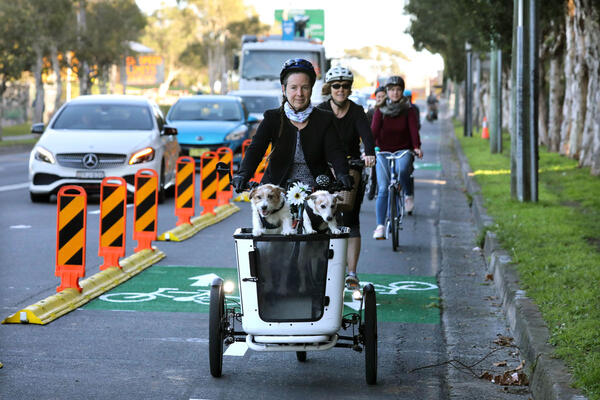
Healthy, Equitable and Sustainable Urban Mobility
Promoting active travel and public transport for a post-pandemic world
Research by Transport for NSW, the University of Sydney and the Australian National University to explore the extent to which the implementation of "pop-up" cycleways and other measures to promote Active Travel, may result in long-term behaviour change and bring public health benefits.
Background
In many major cities, COVID-19 stimulated the provision of open streets, pop up bike lanes and widened pedestrian access, prompting unprecedented increases in cycling and walking. While this type of infrastructure has always been supported by urban planners and designers, the pandemic has served as a vital inflection point, enabling cities to pursue long-term sustainable transport initiatives, including investment in Active Travel (AT). There is an opportunity to promote AT as part of an integrated transport strategy, and to develop tools for the robust evaluation of AT impacts to inform future investment strategies.
Objectives
This research will provide detailed empirical evidence to inform the development of a robust evaluation, monitoring and assessment framework for establishing the wider impact of Active Travel interventions.
The project aims to:
- Quantify, by means of survey and international review of experience, the extent to which active travel (AT) methods such as walking and cycling options have been improved in urban areas during the pandemic and the associated impacts on public health and the environment.
- Develop appropriate methodological framework to measure the extent to which AT may result in long-term behaviour changes and public health benefits, including the pandemic’s influence over local attitudes.
- Implement the framework by contrasting experiences with rapid implementation and locations with varying degrees of maturity/experience.
- Evaluate the wider impact (benefits and costs) of alternative implementation strategies for active travel measures, including a comparison of rapid / tactical delivery models and traditional methods across the case study locations.
- Conduct a policy analysis and propose steps necessary to bring about institutional reform to create new ways of working in partnership between councils, state government and industry in the implementation of AT policies that are more efficient or effective than the status quo.
- Develop guidelines and recommendations for the future evaluation of AT measures both from the perspective of understanding success but also building and assessing business cases.
Updates
Further updates will be provided as this project progresses.
This research is being delivered as an Australian Research Council (ARC) Linkage Project. The ARC Linkage Program supports and promotes research partnerships between higher education organisations, industry, community organisations and publicly funded research agencies.
